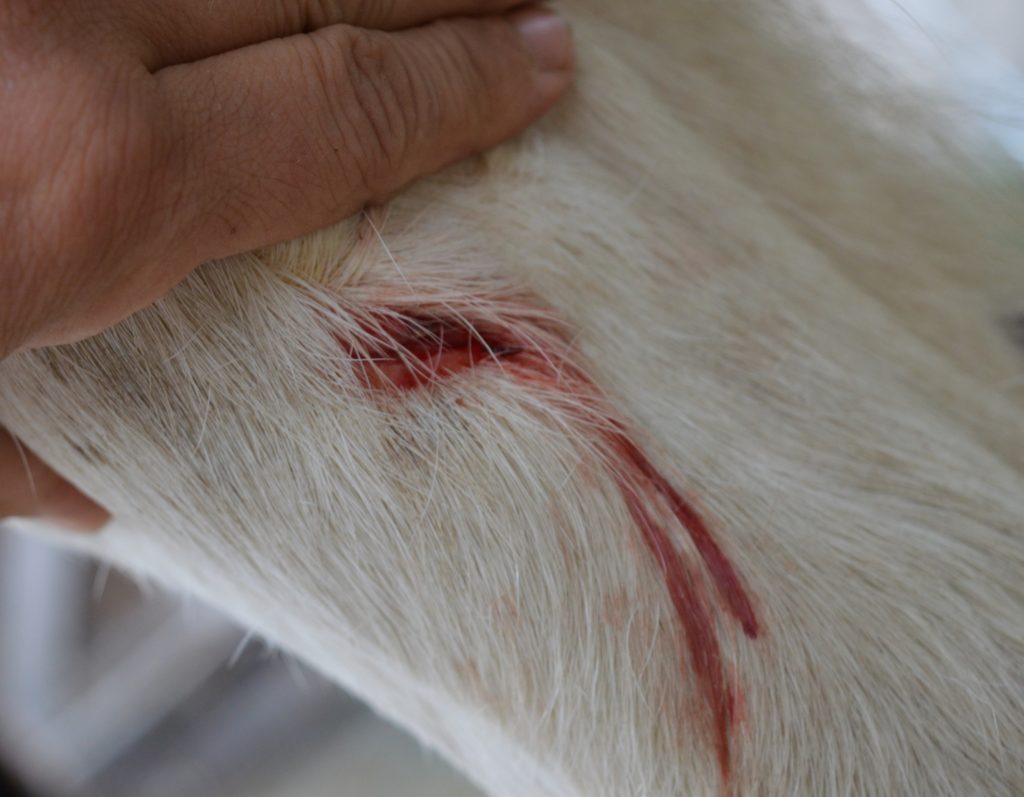Print PDF instructions:
SOLHEDS natural products in the wound care
Smaller cuts and wounds can easily be taken care of in home environment. The essential oils in Derma1 Skin Care shampoo act as natural germ fighter, cleaning the wound area without impairing the surrounding skin. Open wounds are washed with water and antimicrobic Derma6 wound oil , which is non stinging wound oil , suited to open, shallow wounds. Derma6 wound oil’s natural germ fighting essential and vegetable oils, help to reduce skin damage, spreading of inflammation and support the renewal of skin with omega 3,-6, -7 and -9 fatty acids. Derma6 wound oil also assist in providing moisture to the wound. The strong odour of Derma6 wound oil helps to keep the flies away from the wound.
Derma5 Germ Fighting cream is suitable as a wound cream for animals. Wound cream promotes wound healing, reduces itching, softens scabs and prevents skin inflammation. Derma5 cream absorbs well and does not leave a dirt collecting surface and thus support the formation of anaerobic conditions. Many of the causes of serious skin infections are anaerobic, i.e. bacteria, which live in oxygen-free conditions. That’s why it’s important that oxygen-free conditions don’t form on the skin, e.g. due to thick treatment creams.
Derma2 calming serum is an excellent base cream for reconditioning the skin after skin damage and for renewal of hair growth.
Please note that bite wounds and deep stab wounds are easily inflamed. Turn to veterinarian in time.
Wound healing process
The wound process if divided into 4 stages.
1) in inflammation stage the body attempts to protect against the threats of the open wound: such as blood loss, access of foreign particels
2) in debridement stage the body attempts to clean dead tissue and foreign particles,
3) in repair stage, the body activates to repair the damage area,
4) in maturation stage, the body finalizes the repaired new tissue patch. The stage, location and severity of the wound has impact on its’ treatment, which is best evaluated by veterinarian.
The large fleeing animals such as horses, are prone to accidents. There are different kind of wounds. Stab, incision, bite and large wounds usually require a consult from veterinarian. A veterinarian should always be consulted if/when you are uncertain of the treatment. First aid in accidents is to stop the bleeding by compression. The wound should be cleaned thoroughly. Rinsing the wound with water is an efficient way in cleaning the external dirt from the wound.
Wounds are vulnerable to infections. The good wound management is based on keeping the wound clean, preventing infections and supporting the tissue regeneration. Disinfection and antimicrobic compounds are used in the prevention of infection. Povidone iodine, hexetidine, chlorhexetidine and ethanol based products are typical synthetic antimicrobic compounds, which destroy/kill wide range of various microbes. The side effect of these compounds is that they can cause skin irritation and inhibit the tissue regeneration. Ethanol based products usually cause stinging resulting animals to resist the treatment due to the discomfort. Tissue regeneration can be supported by providing moisture on the wound. Many natural compounds e.g. pure essential oils: lavender, mint, lemongrass, thyme, oregano and many others have antimicrobic properties.


